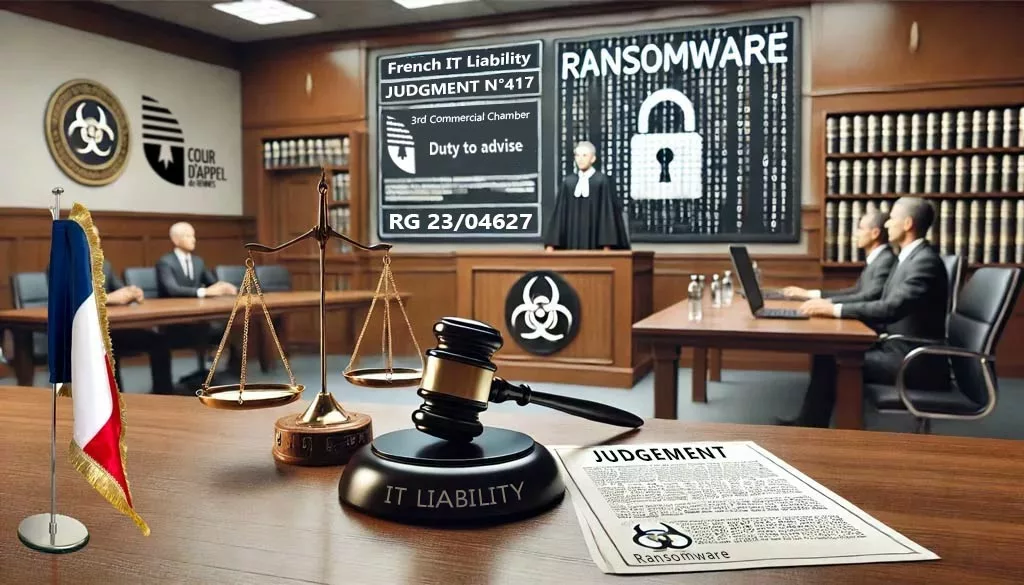The Context of the French IT Liability Case
The Rennes French Court of Appeal examined case RG n° 23/04627 involving S.A.S. [L] INDUSTRIE, a manufacturing company, and its IT provider, S.A.S. MISMO. Following a ransomware attack in 2020 that paralyzed [L] INDUSTRIE’s operations, the company alleged that MISMO had failed in its contractual obligations to advise and secure its IT infrastructure.
This ruling underscores the importance of clear contractual terms, proactive cybersecurity measures, and the legal obligations of IT providers in safeguarding their clients’ operations. For full details, refer to the official court decision.
Timeline of the Case
A three-year legal journey highlights the complexity of IT liability disputes, with a final decision reached on November 19, 2024, after all appeals were exhausted.
Key Milestones:
- July 2019: Contract signed between [L] INDUSTRIE and MISMO to update IT infrastructure.
- November 2019: Installation of equipment by MISMO.
- June 17, 2020: Ransomware attack paralyzes [L] INDUSTRIE.
- July 30, 2020: [L] INDUSTRIE raises concerns about shortcomings in the IT system.
- July 17, 2023: First decision from the Nantes Commercial Court, rejecting [L] INDUSTRIE’s claims.
- July 27, 2023: Appeal lodged by [L] INDUSTRIE.
- September 24, 2024: Public hearing at the Rennes Court of Appeal.
- November 19, 2024: Final decision: MISMO ordered to pay €50,000 in damages.
French IT Liability Case: A Historic Legal Precedent
The French IT Liability Case establishes a historic legal precedent, defining the obligations of IT providers under French law, particularly regarding cybersecurity measures and contractual responsibilities. This ruling marks a new era in jurisprudence for IT liability.
Obligations in IT Contracts Highlighted by the French IT Liability Case
The decision of the Rennes Court of Appeal has garnered significant attention from legal experts, particularly those specializing in IT law and contractual disputes:
- Maître Bressand, a specialist in IT and contractual disputes, highlights that clients dissatisfied with IT services frequently invoke breaches of the duty of advice and pre-contractual information to nullify or terminate contracts. He emphasizes that this decision reinforces the necessity for IT providers to document all recommendations and contractual agreements meticulously (Bressand Avocat).
- The Solvoxia Avocats Firm, in their analysis from November 2024, notes that even in cases where contract termination is attributed to shared fault, IT providers may still be liable to compensate clients for damages. This underscores the criticality of fulfilling advisory obligations to mitigate risks (Solvoxia Avocats).
These perspectives illustrate the evolving expectations for IT providers in France to ensure compliance with legal obligations and prevent potential disputes through proactive advisory roles.
Counterarguments from IT Providers:
IT providers may argue that they cannot foresee every potential cybersecurity threat or implement all best practices without significant client investment. Many providers claim that clients often reject higher-cost solutions, such as disconnected backups or advanced firewalls, citing budget constraints. Additionally, providers may argue that contractual limitations should shield them from certain liabilities when clients fail to follow provided recommendations. Despite these challenges, courts across Europe continue to emphasize the proactive role IT providers must play in cybersecurity.
International Reactions: A Global Perspective
EU Context: Aligning with NIS2 Directive
The French IT Liability Case resonates with the goals of the NIS2 Directive, adopted by the European Union to enhance cybersecurity across member states. The directive emphasizes:
- Proactive risk management: IT providers must anticipate and mitigate risks to critical infrastructure.
- Clear contractual obligations: Providers must outline cybersecurity responsibilities transparently in service agreements.
- Incident reporting: Mandatory reporting of major security breaches to relevant authorities.
This case highlights similar principles, particularly the obligation of advice and the need for detailed documentation of IT service provider responsibilities. For more information, refer to the European Commission’s NIS2 Directive overview.
Comparative Jurisprudence: Cases Across Europe
- Germany: No recent specific cases mirror the Rennes case directly. However, German courts, under the IT Security Act 2.0, have held IT service providers accountable for failing to implement industry-standard measures. These rulings stress the importance of advising clients on state-of-the-art cybersecurity measures.
- United Kingdom: The UK’s Data Protection Act 2018, combined with GDPR, imposes strong obligations on IT providers. While no specific case comparable to the Rennes decision has emerged recently, there is growing emphasis on documenting advisory roles and ensuring client understanding of potential risks.
Global Expert Opinions
International experts have commented on the broader implications of this case:
EU Perspective: A cybersecurity consultant at the European Union Agency for Cybersecurity (ENISA) emphasized:
“This decision aligns with the NIS2 Directive’s push for accountability, showcasing the importance of IT providers as guardians of digital infrastructure.
Academic Insight: Prof. John Smith, University of Oxford, remarked:
“This case sets a legal precedent that encourages IT providers across Europe to rethink how they frame their service agreements, ensuring transparency and proactive risk management.”
Obligations in IT Contracts Highlighted by the French IT Liability Case
In contractual relationships, the type of obligation—result, means, or advice—defines the scope of responsibility. Understanding these distinctions is key to assessing liability in cases like this one.
1. Obligation of Result in the French IT Liability Case
An obligation of result requires the service provider to achieve a clearly defined outcome. Failure to deliver the promised result typically constitutes a breach of contract unless an event of force majeure occurs.
- Example in IT: Delivering a functioning server with pre-configured backups as specified in a contract.
- Relevance to the Case: MISMO was not explicitly bound by an obligation of result to guarantee cybersecurity, as the contract lacked precise terms regarding disconnected backups or external security.
2. Obligation of Means in the French IT Liability Case
With an obligation of means, the provider commits to using all reasonable efforts and skills to achieve the desired outcome, but without guaranteeing it. Liability arises only if the provider fails to demonstrate diligence.
- Example in IT: Regularly updating software, installing antivirus tools, and following industry best practices.
- Relevance to the Case: MISMO claimed to have fulfilled its obligation of means, arguing that [L] INDUSTRIE’s configuration choices were the primary cause of the ransomware attack.
3. Obligation of Advice in the French IT Liability Case
The obligation of advice is particularly critical in technical fields like IT. It requires the provider to proactively inform clients about risks, suggest best practices, and propose solutions tailored to their needs. This decision by the court reinforces the significance of the obligation of advice as a cornerstone of IT service contracts. Providers must now anticipate potential risks, such as ransomware vulnerabilities, and recommend appropriate countermeasures to their clients. Failing to do so can result in legal liabilities and damage to their professional reputation.
- Example in IT: Advising on disconnected backups or flagging the risks of integrating backup systems into Active Directory.
- Relevance to the Case: The court ruled that MISMO failed its obligation of advice by not recommending critical safeguards, such as isolated backups, which could have mitigated the impact of the ransomware attack. This decision sets a precedent, urging IT providers to go beyond standard measures and provide proactive, well-documented advice tailored to each client’s needs.
Comparative Table: Types of Obligations in the French IT Liability Case
| Type of Obligation |
Definition |
Example IT |
Relevance to the Case |
Example from the Rennes Case |
| Result |
The provider must guarantee a specific, defined outcome. (Article 1231-1: Compensation for non-performance of contractual obligations) |
Delivering a fully operational server with backups as specified in a contract. |
Not applicable here, as the contract did not include explicit cybersecurity guarantees. |
The contract lacked provisions requiring disconnected or external backups to be implemented. |
| Means |
The provider must employ all reasonable efforts and expertise to achieve the objective. (Article 1217: Remedies for contractual breaches) |
Regularly updating software, configuring antivirus tools, and implementing best practices. |
MISMO claimed they fulfilled this obligation by maintaining the system, but inconsistencies in implementation were noted. |
MISMO argued they had installed antivirus software but failed to monitor its effectiveness consistently. |
| Advice |
The provider must proactively inform the client of risks and suggest tailored solutions. (Article 1112-1: Pre-contractual duty of information and advice) |
Advising on disconnected backups or warning about vulnerabilities in Active Directory integration. |
The court ruled MISMO breached this obligation by not recommending isolated backups to mitigate ransomware risks. |
MISMO failed to advise [L] INDUSTRIE on the importance of air-gapped backups, leaving critical data exposed to ransomware. |
To further clarify the legal foundation of these obligations, the following Civil Code articles are critical to understanding their application.
Civil Code Connections for IT Obligations
Connecting Obligations to the French Civil Code
Understanding the legal foundations of IT obligations is essential for providers to align their practices with French law. The following articles provide critical legal context:
- Article 1231-1: Focuses on compensation for non-performance of contractual obligations. For obligations of result, it underscores the importance of explicitly defined deliverables in contracts.
- Article 1217: Covers remedies available in cases of contractual breaches, including compensation, specific performance, and contract termination. This article is relevant to obligations of means, where diligence and reasonable efforts are assessed.
- Article 1112-1: Establishes the pre-contractual duty of information and advice, requiring providers to inform clients of critical risks and suggest appropriate solutions. This is pivotal for obligations of advice, where courts assess the quality of recommendations made by providers.
These legal provisions clarify the responsibilities of IT providers and their alignment with contractual obligations, offering actionable guidance for both providers and clients.
Context and Historical Background
The Legal Framework Governing IT Obligations
French law imposes specific obligations on IT service providers to inform, advise, and implement solutions that meet clients’ needs. This case sets a significant precedent by clarifying these obligations and emphasizing the need for IT providers to document their advisory roles comprehensively. Key legal references include:
- Article 1103: Legally formed contracts are binding on those who made them.
- Article 1112-1: Pre-contractual duty of information. A party who knows information that is crucial to the other party’s consent must inform them.
- Article 1217: Addresses the consequences of a contractual breach, including damages and interest.
- Article 1604: The seller’s obligation to deliver. The seller must deliver the agreed-upon item.
- Article 1231-2: Governs liability for harm caused by contractual failures.
- Article 1231-4: Stipulates that damages must correspond to the loss directly linked to the contractual fault.
This legal framework underscores MISMO’s failure to fulfill its duty of advice, highlighting the critical role IT providers play in protecting clients from cybersecurity risks. Providers are now expected to clearly outline the risks and recommended solutions in formalized documentation, ensuring transparency and accountability in their advisory roles.
Technical Insights: What Went Wrong in the French IT Liability Case
While MISMO’s defenses highlighted gaps in the client’s internal practices, such as misconfigured firewalls and excessive privileged accounts, the court ruled that the provider’s duty of advice superseded these client-side shortcomings. However, IT providers may argue that the lack of a detailed and enforceable contract limits their ability to mandate best practices.
The Ransomware Attack
On June 17, 2020, a ransomware attack encrypted [L] INDUSTRIE’s data, including backups. The attack exploited several vulnerabilities:
- Weak internal configuration (e.g., excessive privileged accounts).
- Backup servers integrated into Active Directory, making them accessible to attackers.
- Absence of disconnected or external backups.
Lessons from the Attack
- Disconnected Backups: Essential for restoring data even if primary systems are compromised.
- Centralized Threat Detection: The lack of unified antivirus left endpoints vulnerable.
- Misconfigured Firewalls: Open-source firewalls without robust updates increased risks.
- Cloud-based Solutions: Offsite backups enable faster recovery and greater resilience.
SMEs: Cybersecurity Challenges and Protection Strategies
Why SMEs Are Vulnerable
- Limited Resources: SMEs often lack budgets for comprehensive cybersecurity.
- Absence of Expertise: Few SMEs employ dedicated IT or cybersecurity staff.
- Frequent Targets: Cybercriminals exploit SMEs as entry points to larger networks.
Key Statistics
How SMEs Can Protect Themselves
- Backup Solutions: Implement air-gapped and offsite backups.
- Employee Training: Educate staff on recognizing phishing attempts.
- Proactive Investment: Adopt affordable antivirus and firewalls.
Best Practices for IT Providers to Avoid Legal Disputes
- Document Recommendations: Provide detailed reports on identified risks and suggested solutions.
- Offer Advanced Options: Propose enhanced security measures, even at additional costs.
- Educate Clients: Explain the long-term impacts of cybersecurity choices.
- Regular Updates: Ensure systems are updated with the latest patches and security tools.
- Proactively educate clients about legal obligations for IT service providers, including risk mitigation strategies for ransomware attack








